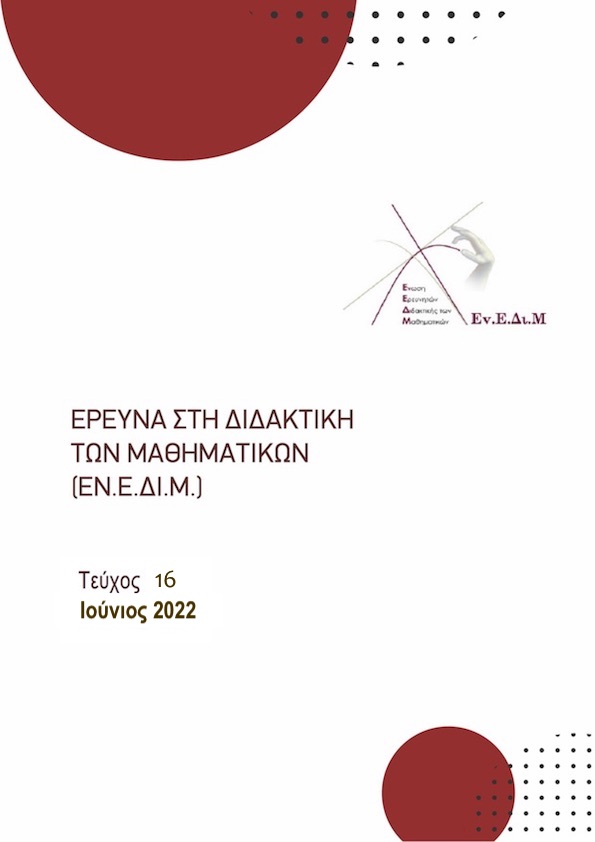ΟΨΕΙΣ ΤΗΣ ΜΑΘΗΜΑΤΙΚΗΣ ΓΝΩΣΗΣ ΓΙΑ ΤΗ ΔΙΔΑΣΚΑΛΙΑ: ΜΙΑ ΕΜΠΕΙΡΙΚΗ ΜΕΛΕΤΗ ΜΕ ΕΚΠΑΙΔΕΥΤΙΚΟΥΣ ΤΗΣ ΔΕΥΤΟΡΟΒΑΘΜΙΑΣ ΕΚΠΑΙΔΕΥΣΗΣ.
Abstract
Στην παρούσα εργασία παρουσιάζεται μια εμπειρική μελέτη με στόχο τη διερεύνηση πτυχών της Μαθηματικής Γνώσης για τη Διδασκαλία εκπαιδευτικών της δευτεροβάθμιας εκπαίδευσης. Πραγματοποιήθηκαν ημι-δομημένες συνεντεύξεις με 15 εν ενεργεία εκπαιδευτικούς που κλήθηκαν να αξιολογήσουν απαντήσεις υποθετικών μαθητών σε ερωτήματα σχετικά με την πυκνή διάταξη των ρητών αριθμών, να εξηγήσουν τον τρόπο σκέψης των μαθητών, και να δώσουν ανατροφοδότηση. Τα ευρήματα της έρευνας αναδεικνύουν αδυναμίες όσον αφορά την Κοινή και την Εξειδικευμένη Γνώση του Περιεχομένου, τη Γνώση του Περιεχομένου και των Μαθητών και τη Γνώση του Περιεχομένου και της Διδασκαλίας.
Article Details
- How to Cite
-
Αυγέρη Θ. Φ., & Βαμβακούση Ξ. (2022). ΟΨΕΙΣ ΤΗΣ ΜΑΘΗΜΑΤΙΚΗΣ ΓΝΩΣΗΣ ΓΙΑ ΤΗ ΔΙΔΑΣΚΑΛΙΑ: ΜΙΑ ΕΜΠΕΙΡΙΚΗ ΜΕΛΕΤΗ ΜΕ ΕΚΠΑΙΔΕΥΤΙΚΟΥΣ ΤΗΣ ΔΕΥΤΟΡΟΒΑΘΜΙΑΣ ΕΚΠΑΙΔΕΥΣΗΣ. Research in Mathematics Education, (16), 26–45. Retrieved from https://ejournals.epublishing.ekt.gr/index.php/enedim/article/view/28087
- Issue
- No. 16 (2022)
- Section
- Articles

This work is licensed under a Creative Commons Attribution 4.0 International License.
Authors who publish with this journal agree to the following terms:
Authors retain copyright and grant the journal right of first publication with the work simultaneously licensed under a Creative Commons Attribution licence that allows others to share the work with an acknowledgement of the work's authorship and initial publication in this journal.
Authors are able to enter into separate, additional contractual arrangements for the non-exclusive distribution of the journal's published version of the work (e.g. post it to an institutional repository or publish it in a book), with an acknowledgement of its initial publication in this journal.
Authors are permitted and encouraged to post their work online (preferably in institutional repositories or on their website) prior to and during the submission process, as it can lead to productive exchanges, as well as earlier and greater citation of published work (See The Effect of Open Access).



